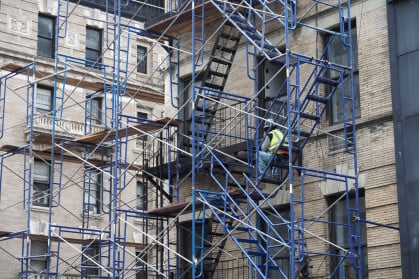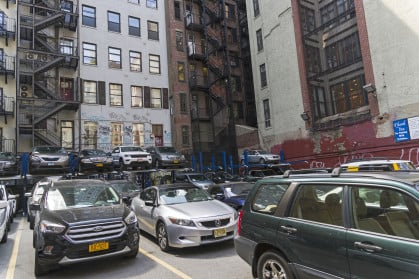How I broke up with my property manager and learned to love my self-managed condo building
- Board president Tatiana Peck had “no trust left” after getting ghosted by her former property manager
- She says her building expects to save around $5,000 in 2024 through self-management and by paying out past bills

Breaking up is never easy, but for this Williamsburg condo, the board president believes it was the right move.
iStock
Tatiana Peck, a former Meta strategist-turned-president of her seven-unit Williamsburg condo building, says her building had three property management companies before the board decided to take things in a different direction. Since her five-year old building became self-managed in 2023, Peck says it has been running far smoother, and importantly, more transparently. Plus, she expects to save around $5,000 by taking on its own management and in paying out its former manager’s contracts. Here, she shares the lessons she’s learned from breaking up with her property manager.
It's really difficult to get a sense of how property management companies operate. There's not a ton of transparency. So our building went through two property management companies, and by the time that we were getting to the third, that was when I decided to join the board. A bunch of other units had taken on that responsibility, so it felt like it was my turn.
We started interviewing smaller property management businesses to get more of the care and attention that we wanted, and landed on one. This guy was very charismatic, he had worked in this field for many years, he was a local, and he pointed out a lot of things about our building that he felt the developer should’ve handled. It felt like it was going in the right direction.
But while he was nice, we found that he was not as organized as he should have been. And then he completely vanished.
[Editor's Note: Brick Underground's Inside Stories feature first-person accounts of interesting, real-life New York City real estate experiences. Have a story to share? Drop us an email. We respect all requests for anonymity.]
Moving from one manager to another
First off, the transition between our last property manager and the new guy was particularly hairy.
The previous company held onto some of our reserve money for months before returning it—to the point where we had to threaten legal action. We finally got it back, but only four or five months later, which is super terrifying for a small building that doesn't have a lot of reserves.
We transitioned to our new property manager in 2023, and when July rolled around, he was supposed to be managing the sale of our former president’s apartment. But then I started getting all these emails from the owners, the lawyers, and the real estate agent, saying they needed certain papers. Long story short, I had to step in and handle some of the sale because our manager was non-responsive. Weeks go by and nothing. It’s like he disappeared.
We quickly realized that we didn’t know the behind the scenes of how he managed the building. I had to go through four years of emails and Google Docs to try to piece back together its operations.
At that point, I realized I had no trust left. Who am I going to believe about how they run a building? Everybody says the right thing. We had done the due diligence. Not to mention that what we have been paying the last property manager wasn't a ton, even though we weren't getting what we deserved out of it. So we didn't have a huge budget to play with.
Taking a hard look at the budget
With our last manager, we were paying something close to $1,200 a month that was supposedly inclusive of trash and cleaning. I say supposedly because back when the city changed its trash and recycling pickup hours, that completely broke our property manager.
The cleaning guy and trash guy he worked with could not come in late at night, so we were without someone cleaning the building for months. Myself and the other apartment on the ground floor took turns every week cleaning and taking out the trash. Luckily, we ended up finding someone new who we’re so pleased with. It’s $750 a month and the place has not been cleaner.
In 2023, we had to pay over $8,000 in expenses for services that were rendered before that year. We always owed that money, but it had not been dealt with by our property managers. I had to dig through emails and paperwork for any shred of evidence of who we might have worked with. I even reached out to companies.
Our total assets decreased by about 13 percent in 2023. We still ended up putting away about 10 percent of our operating budget in reserves. I was able to negotiate some of our vendors down, and we walked away from the year having taken care of a lot of major issues.
Technically, we saved money from August through December by not spending the extra $500 that we were spending on property management and cleaning, but there were a lot of things that were not dealt with in the building. There were issues that were not just the last property manager’s fault, it was everyone since the beginning of the building.
In 2023, we were really focused on making sure we didn’t owe anyone anything, that we had all the right vendors in place, and hit all the major compliance needs for the building. If everything goes well, our budget projects us spending at least $5,000 less this year than we did last year. Our operating budget is just shy of $50,000 a year, so it's a small budget, and the fact that we could save $5,000 if everything goes to plan is very exciting.
Hopefully our expenses are going to be a lot lower in 2024. This year is the year to really confirm that this approach is working for us. The goal is in 2025 to have a little reduction in common charges.
Greater savings, but more work for the board
Those savings are a mix of becoming self-managed, avoiding surprise bills, and negotiation. For example, we have a fire alarm system that has two phone lines which go directly to the central station to notify the fire department.
At the beginning of last year, the alarm kept going off and it gave us an error message. Every time we had folks come in to fix it, it cost hundreds of dollars. The property manager is supposed to be at the building when the vendor comes, but whoever signed off on the visit didn’t implement the feedback to solve the problem, which was that our phone lines weren’t in service.
It wasn’t until I was president that I realized that our alarm system hadn’t been set up properly. I kind of read the fire alarm company a little bit of a riot act, and was able to get a discount because they came to the building multiple times and didn’t address the same error message. You need to have people fighting for you, and that’s the hope of the property management company: that they go to bat for you, that they make sure you’re not being taken advantage of, and that they can negotiate for you.
Becoming self-managed has definitely increased the time commitments of the board. It is work, but I think it’s manageable. Every day I check our building management software Super, to make sure there are no issues. And then we have our monthly board meetings where we prepare our finances.
I come from a strategy and technology background, so setting up and organizing our documents and using the technology that we have makes it not that hard to keep it running. It also just feels good; this is my home, and I feel very proud of taking care of the building.
It was worth it in the end, but think it through
Short answer: I think it has been worth it. Taking control of how the building operates, what the building's priorities are, how to spend an operating budget—all those things have been an incredible learning experience. And just in the first six months, our finances are healthy and we have been tackling all the major issues in the building.
One of the reasons why this was doable for us is that we’re still a relatively young building. We’re only five years old, so we didn’t have major issues with the building. If you live in a very old building and things are crumbling, maybe self-management could be hard, because there would be a lot of work and a lot of projects.
But it’s not impossible. You need to take a look at your organization, documentation, and the way you communicate with residents and owners. That’s where working with Super has been so invaluable.
Finally, you need to make sure your whole board is aligned. We had our annual owners meeting where we presented all the major milestones of the previous year as well as our finances and projected budget, but by the end of it, lots of folks in the building offered to help us with projects. There’s an aspect of this where you can invite in non-board members on committees to help tackle some issues.
Sign Up for our Boards & Buildings Newsletter (Coming Soon!)
Thank you for your interest in our newsletter. You have been successfully added to our mailing list and will receive it when it becomes available.





















